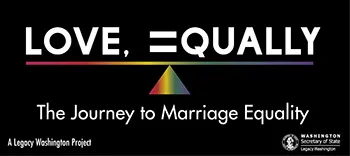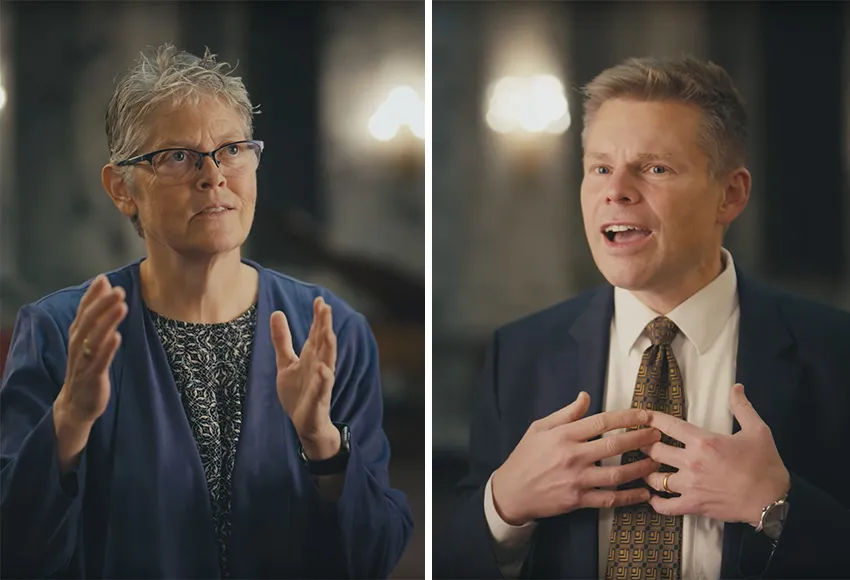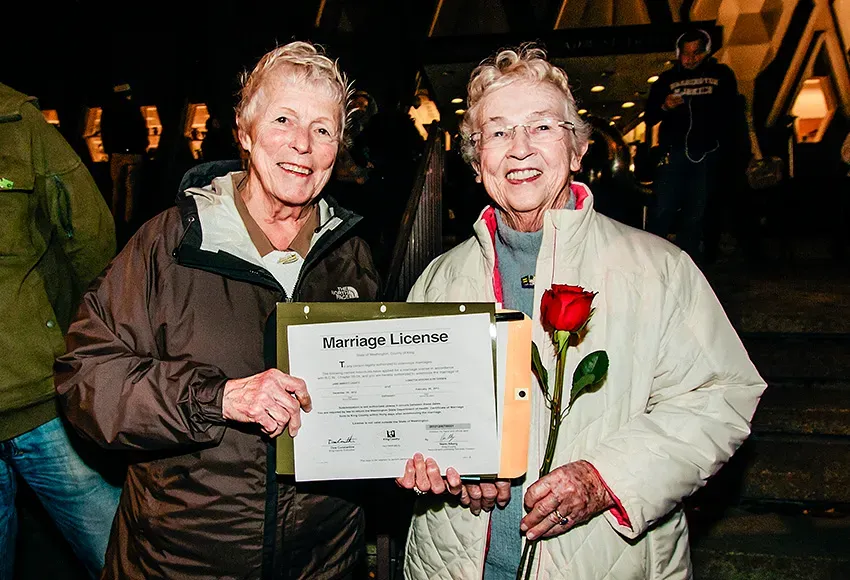Save the date of February 14! This Valentine's Day, Legacy Washington will reveal its latest exhibit, a testimony to the strength of activism and the perseverance of love, featuring oral histories and firsthand accounts detailing the fight for marriage equality.

The idea for the exhibit arose nearly two years ago, as historians finished celebrating another landmark legislative anniversary. "We were looking for our next exhibit to bring in after COVID," Legacy Washington historian Aaron Peplowski said. "Our previous exhibit was around the 19th Amendment, suffrage, and how Washington had several women who were deep into getting the women's vote."
"Washington [gave women the] vote in 1910, so we had this neat idea to connect that old history with the things that we do now," he continued.
Previous exhibitions curated by Legacy Washington have wowed patrons with their use of firsthand accounts of historical events. The team knew they wanted to continue using stories from living people, so they decided to focus on legislative victories in recent history.
"The goal of the program was to use oral history," Peplowski said. "Then COVID shut everything down. We knew when we reopened that we wanted to have something impactful and in line with the type of exhibits we've had before, but we also wanted to make sure that we went with the oral history."
Washington marriage equality turns 10!
2022 was the 10th anniversary of Washington's legalization of same-sex marriage. The topic was perfect for historians to craft an exhibit around.
"It's all about the 10th anniversary of marriage equality," Peplowski said. "We felt that that was a huge milestone, and Washington, in our old terminology, was 'ahead of the curve' on that. We weren't the first, but we were in that big chunk of states that voted in 2012 on whether or not marriage equality would be legal."
While the vote on marriage equality in Washington state happened in 2012, making 2022 the 10th anniversary, the exhibit curators knew they needed a little more time before they unveiled their project. So they set the date for Valentine's Day of 2023, while acknowledging that the fight for marriage equality did not have one specific start or end date.
"The first legislation that made it was in 2012... on February 13. It was put to a vote. On Election Day, voters [approved Referendum 74 upholding the law]," Peplowski said. "The first marriage licenses were signed on December 6, then there was a three-day waiting period. So December 9, 2022, was the 10th anniversary. We knew we weren't going to have the exhibit done at that point, so we did our 'save the date' and made this video. That was our 'Hey, this is our next thing, and it will be open on Valentine's Day this coming year.' We wanted to show something modern but also [with] a historic date attached to it."

Learning through oral history
What sets this new exhibit apart from others is that marriage equality is still very recent in history. Even though it has only been 10 years since Washington legalized same-sex marriage, acceptance of LGBTQ+ people has become relatively normalized in American culture. Legacy Washington wanted to ensure that viewers know just how far we've come in such a short amount of time.
For that, the curators made panels from oral history interviews sculpted into profiles.
"What we want[ed] to do is attach a present state of mind to what people were thinking when they went through it," Peplowski explained. "To go straight to the primary source in oral history, you can say, 'This is what that person was thinking, to the best of their memory, at that time.' You get to collaborate and bring together all those voices. You get not only oral histories, if people want to see those directly, but ...the narrative through it all."
Focusing on recent history also meant the research process was different. Instead of focusing on written accounts of a specific time, the researchers spent most of their time talking with real people who experienced the struggles firsthand.
"We wanted to talk to the people we knew were specifically involved in [advocating for marriage equality] and have them guide us to the other people we needed to talk to," Peplowski said. "We talked to people who were in the early stages of getting ...bills passed, domestic partnership, and who was at the forefront of current issues. It's cool to hear directly from them instead of going to the sources in the index of a book. You can talk to people who [were] living it. That's the exciting thing about the projects we do."
Local focus
Another thing that sets Legacy Washington's exhibit apart from similar ones is that it focuses on the struggle for marriage equality in this state. Of course, it also notes the national movement, but the big players featured in the exhibit are local heroes.
"What we wanted to focus on, specifically, was the Washington experience," Peplowski said. "We are a Washington program, and we have specific legislation that we can point to, whether it was the state bill passed by the legislature in 2012 and signed by then-governor Gregoire or Referendum 74, which is what the people voted on. ...[The exhibit] does point to [national] things passed earlier on, because those too reflect the experiences of people we interviewed, going back to Stonewall and 'Don't Ask, Don't Tell' in the military, all sorts of different things that were points along the way for a collective movement. But we wanted to focus on how in Washington we got same-sex marriages."
One of Peplowski's favorite parts of the research was exploring how social trends in the United States led to a shift in ideas around LGBTQ people.
"Looking at the different trends of it, you could tell that there was a national movement towards accepting LGBTQ lifestyles reflected in pop culture. A lot of people referenced Ellen. When she first came out it, was this whole thing. Then her show got canceled, but not too long after that, Will and Grace specifically had multiple Gay characters from the start. So, you knew that attitudes were changing. National books, including The Engagement by Sasha Issenberg, were great ones that we referenced quite a bit. That details how culture changed, so we wanted to give what the Washington experience was, which nobody had done, specifically."
After spending nearly a year fact-checking and aiding in research, Peplowski has learned a lot about the LGBTQ civil rights movement. One of the most inspiring things he discovered was how pivotal young people were, and continue to be, when it comes to advancing social change.
"The thing that I've noticed the most that is always heartwarming is the involvement of the youth in fighting for what they want, between climate activism or trying to do something about safety in schools, school shootings, and whatnot. It has the same feel as the student protests of the Vietnam War.
"If people keep those ideas and that willingness to gather and peacefully protest and change activism into legislation, I think we're going to see the will of the young people can become the law of the land. There tends to be a lot more acceptance amongst the young. The comfort level that people have now about being out... I know it is still a struggle, but compared to when I was in high school, and then my parents even more so, it's tracking in such a phenomenal way. I'm excited to see how people define themselves, how they fight to be defined in legal status," he said.
Exhibit opening details
The exhibit will be open to the public starting on February 14 at the State House in Olympia and will be on display for the year.
The researchers are all very proud of their work and can't wait to see the unveiling of the final product.
"We're now in the waiting period. We want to talk about it, but most of all, we want to unwrap our gifts on February 14. Hopefully, people will come. It's a public exhibit. There will be a public opening from 3 to 5 p.m. on the 14th. It shouldn't ruin anybody's dinner plans. They can come, see this, have a lot of good moments, and enjoy the work we put in, and then some cool speakers will be there. It's going to be a good celebration."
Speakers for the event opening will include Gov. Jay Inslee, Secretary of State Steve Hobbs, Speaker of the House Laurie Jinkins, Sen. Jamie Pedersen, former Gov. Chris Gregoire, Washington LGBTQ Commission Executive Director Manny Santiago, and historian Stephanie Coontz. The event will also feature live music performed by the Seattle Supertonics, a mixed group of performers from the Seattle Men's and Women's Choruses.
"This has been a really exciting project all the way through, a labor of love," Peplowski added. "I'm just really impressed with what our authors have come together to do. We've got a sharp-looking book, and the exhibit – all the photos for it – look great, and eventually, it will be on the wall there in the secretary of state's office.
Future plans: online, book, touring
For people interested in viewing the exhibit but unable to make the trip to the capital, a virtual tour will also be launched online the same day.
"Everything we have will be on https://www.sos.wa.gov/legacy/, including all our previous exhibits and books. On February 14, front and center, the first image will likely be [for] the virtual exhibit, which will give the rundown of everything, what you can read online, all the people in it, and links to buy the book, donate, and support."
For people outside of Olympia hoping to see the exhibit, Peplowski says there will be plenty of chances. "It will be up for at least a year, and then it will start moving around, and we will keep you guys in the loop of where it might go, because it could wind up a lot closer to Seattle in some form or fashion."
Legacy Washington will also release a more in-depth book, about the activists who worked hard to pass marriage equality in the state. The book will eventually be available online in PDF format and in all public libraries.
While financial support is always encouraged, the goal of Legacy Washington is to make history accessible to all.
"All our costs are covered by the 501(C)(3) foundation... While our salaries are covered, we still need a little boost to get our things out there," Peplowski said. "Luckily we've had a little help from people like the SGN and the Greater Seattle Business Association.
"...More than anything else, we want to get these stories out there, because they're extraordinary. We've been lucky enough to capture them while people are still alive to tell them. We want to continue to do that and get good ideas from the public of what they want to see."


